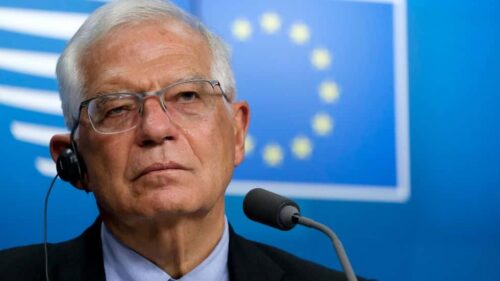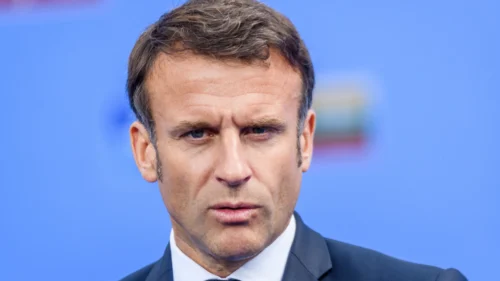For the past 19 months, European leaders have attempted to obscure their characterization of what appears to be a clear and consistent pattern of behavior by the Israeli government in its response to the revolt organized by Hamas on October 7, 2023. Most non-political observers with no vested interest in either the Israeli government or Palestinian organizations tend to agree with the assessment of the International Court of Justice from January 2024 that there is a “plausible” case for describing Israel’s actions reported in the period preceding that declaration.
Even at the time, genocide wasn’t a difficult case to make. Whatever it was then has become demonstrably more flagrant today. At the very least, systematic attacks on healthcare infrastructure, explicit acts of collective punishment and deliberate, organized starvation all fall squarely into the category of war crimes under the Geneva Convention.
Many of the world’s governments, particularly in the West, have preferred to practice what they may think of as a style of “diplomatic discretion” that prevents them from explicitly condemning Israel’s actions. Few have taken any bold steps to use whatever political clout they could muster to prevent Israel from turning a plausible genocide into a fait accompli we Europeans just have to learn to live with. Several European nations have even continued to provide military assistance to Israel throughout the period.
Ireland, Belgium and Spain are the only members of the European Union to have literally accused Israel of war crimes and followed it up with an arms embargo. In contrast, Germany, the United Kingdom and the United States have continued to back Israel militarily, even while occasionally hinting to Israeli Prime Minister Bibi Netanyahu’s government that they would feel more comfortable if he were to tone down the destruction a bit. Italy initially paused arms exports but later resumed them quietly. “Piano, piano!” Prime Minister Giorgia Meloni seemed to be saying. Bibi, the Israeli virtuoso, naturally interprets her words as an invitation to play, with unusual brio, his latest resounding apocalyptic concert on her keyboard.
Emmanuel Macron’s France, to its credit, has consistently supported UN ceasefire resolutions, knowing the US would veto them, but adamantly refuses to call Israel’s actions genocide, collective punishment or ethnic cleansing. At the same time, it has refused a full arms embargo but, to demonstrate its empathetic rhetoric with a suffering population, has restricted the supply of certain weapons.
In other words, despite a few courageous initiatives from a small minority of governments, the Atlantic alliance — the US, European nations and the EU itself — has remained relatively unified in solidarity with Israel. From the beginning the US has led the fanfare, first under Biden and then, despite a visible change of style, under Israel’s favorite US president of all time, Donald Trump.
Nevertheless, the pressure is mounting and some of the seams appear to be cracking. Just last week, Macron characterized the humanitarian situation in Gaza as “intolerable,” adding that it has become “unprecedented” (inédit). By “unprecedented” he meant that Israel’s conduct today appears to be even worse (aggravée) than it was at any earlier point in the campaign. In other words, his complaint is less about the nature of the act than the degree, as if war crimes can simply evolve quantitatively before crossing the distant threshold of genocide. This kind of reasoning enables Macron to maintain a position that falls short not only of having to utter the g-word, but of acting in any concrete way upon his perception of ongoing horror.
Nevertheless, the temperature is clearly rising. France’s state-owned radio news network Radio France Internationale (RFI) reports that Macron’s government has at least begun thinking about the theoretical tipping point beyond which it becomes necessary to evoke gross violations of international law. “French Foreign Minister Jean-Noël Barrot,” RFI informs us, “has voiced his support for reviewing the EU-Israel Association Agreement, amid growing concern over the humanitarian crisis in Gaza.”
Our Devil’s Dictionary has recently highlighted the moral ambiguity associated with prominent political figures who voice “concern.” But Barrot provides another clue about the strength of France’s moral fiber when he proclaims: “This is a legitimate request, and I invite the European Commission to examine it.”
Today’s Weekly Devil’s Dictionary definition:
Legitimate request:
A timidly formulated hope that others will recognize a moral stance unwilling to take the form of a commitment. It contrasts with what the same parties see as an “illegitimate request,” such as firmly demanding the cessation of a genocide.
Contextual note
The French have always cultivated the idea that they are a generous and welcoming people, clearly reflected in Barrot’s promise to “invite” the European Commission to review its solidarity with a nation credibly engaged in genocide. Note that the invitation aims not at changing the relationship or taking any concrete action, but at examining it.
That attitude of bold moral resoluteness turned out to be too much for the currently disenfranchised leader of the opposition to Macron’s regime, Marine Le Pen, who saw no need for a review. “Israel is doing what it can in a situation that is extremely difficult,” she charitably explained. Her reasoning may follow a well known pattern: Any nation that would go so far as to invite the opprobrium attached to practicing live-streamed genocide and ethnic cleansing would only do so in response to an extremely difficult situation. Take the case of Nazi Germany, whose regime Marine’s father (and founder of her party) openly admired. After losing World War I, the German nation found itself humiliated by the victors, saddled with exorbitant reparations to pay that in turn provoked raging inflation that undermined the economy and destabilized the government. The world treated Deutschland as the sole culprit in a war Europe’s leaders had collectively sleepwalked into. In such extremely difficult circumstances, it is natural that only a holocaust could follow.
Le Pen herself has undergone the humiliation and disgrace of being barred by the courts from running in an election, even though the polls put her in the lead for the 2027 presidential election. That may help explain her current position on Israel, which she expressed in her critique of Macron’s impatience with Israel: “He is constantly increasing his criticism of Israel, perhaps because it is incapable of providing a solution to facilitate the fight against Islamist fundamentalism.” The German example may have convinced Le Pen that when attempting to “provide a solution” the only surefire way of achieving one’s goal is by aiming at a “final solution.”
Historical note
Historical inertia, the patient acceptance of immoral behavior as a fait accompli or feature of the landscape, has become a standard response for leaders like Macron. Le Pen is right to point out that he has no solutions, but that won’t prevent him from defending to the death his right to hold onto power and prevent anyone who might have solutions from applying them. The current class of European leaders has become adept at using the perception of intolerable situations as faits accomplis that can never be seriously questioned as the most convenient way to define and maintain their dangerously confused policies. This is especially true with regard to the two major conflicts they appear committed to: a Ukraine war started and then apparently abandoned by the US, and Israel’s noble “self-defense” against a captive, occupied and confined population whose cowardly soldiers hide behind human shields composed essentially of women and children.
If it didn’t involve the sacrifice of probably more than a million Ukrainians and Russians, the case of Europe’s inertia with regard to Ukraine may appear comic, at least since the return of US President Donald Trump to the White House. The Donald has embarrassingly made it clear he’s ready to pull out of a war his predecessors encouraged Europe to join. The belief initially inculcated by US propaganda that Ukraine has the capacity to win a war designed to humiliate and eventually dismantle Russia is already delusional. But formulating the project of replacing the clout of the US — which under Trump is withdrawing from the fight — and believing that Europe’s commitment could turn the tide is positively surreal.
Europe’s backing of Israel follows the same pattern. Former US President Joe Biden set the tone and Europe followed suit. In this case, NATO solidarity could not provide the pretext, but the logic was identical. The US leads NATO and NATO leads Europe; with or without NATO, the US has led Europe… by the nose. That’s what Europeans have accepted as a “security system” (some would call it a security blanket). It is not limited to Europe and its periphery. It applies even to nations in West Asia. It should be noted that Macron, thanks to his obsession with the idea of “strategic autonomy,” is the rare European leader in recent times to have expressed his desire to refuse the status of vassal to the US. Note that he “desires” to “refuse” which means quite simply that he will not dare to refuse.
The policy of passive conformity with the policies of other nations — Israel and the US — who have fewer qualms about engaging in evil, may now be coming back to bite Europe and France. A group of French “Jurists for the Respect of International Law” (JURDI) have taken legal action, sending a formal notice (mise en demeure) addressed to the European Commission and the European Council calling for “the immediate suspension of all agreements of cooperation with Israel,” individual sanctions imposed on responsible parties and exclusion of Israel from the SWIFT payment system. These are all measures that the Europeans rapidly applied to Russia following its invasion of Ukraine in February 2022.
As Le Monde reports, this is an accusation of “institutional complicity.” Readers will note the radical difference between a mise en demeure (a formal legal act) and a “legitimate request.”
*[In the age of Oscar Wilde and Mark Twain, another American wit, the journalist Ambrose Bierce produced a series of satirical definitions of commonly used terms, throwing light on their hidden meanings in real discourse. Bierce eventually collected and published them as a book, The Devil’s Dictionary, in 1911. We have shamelessly appropriated his title in the interest of continuing his wholesome pedagogical effort to enlighten generations of readers of the news. Read more of Fair Observer Devil’s Dictionary.]
[Lee Thompson-Kolar edited this piece.]
The views expressed in this article are the author’s own and do not necessarily reflect Fair Observer’s editorial policy.
Support Fair Observer
We rely on your support for our independence, diversity and quality.
For more than 10 years, Fair Observer has been free, fair and independent. No billionaire owns us, no advertisers control us. We are a reader-supported nonprofit. Unlike many other publications, we keep our content free for readers regardless of where they live or whether they can afford to pay. We have no paywalls and no ads.
In the post-truth era of fake news, echo chambers and filter bubbles, we publish a plurality of perspectives from around the world. Anyone can publish with us, but everyone goes through a rigorous editorial process. So, you get fact-checked, well-reasoned content instead of noise.
We publish 3,000+ voices from 90+ countries. We also conduct education and training programs
on subjects ranging from digital media and journalism to writing and critical thinking. This
doesn’t come cheap. Servers, editors, trainers and web developers cost
money.
Please consider supporting us on a regular basis as a recurring donor or a
sustaining member.
Will you support FO’s journalism?
We rely on your support for our independence, diversity and quality.











Comment